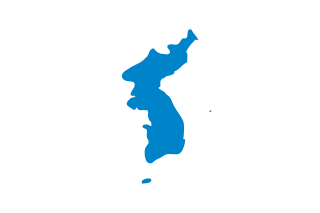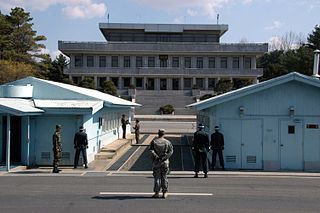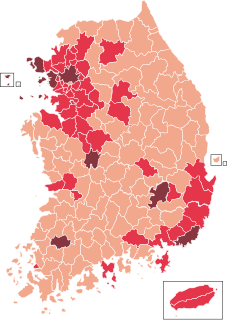
Korea is a region in East Asia. Since 1945 it has been divided into two sovereign states: North Korea and South Korea. Korea consists of the Korean Peninsula, Jeju Island, and several minor islands near the peninsula. It is bordered by China to the northwest and Russia to the northeast. It is separated from Japan to the east by the Korea Strait and the Sea of Japan.

Korean is an East Asian language spoken by about 77 million people. It is the official and national language of both Koreas: North Korea and South Korea, with different standardized official forms used in each country. It is a recognised minority language in the Yanbian Korean Autonomous Prefecture and Changbai Korean Autonomous County of Jilin Province, China. It is also spoken in parts of Sakhalin, Russia and Central Asia.

The Korean War was a war between North Korea and South Korea. The war began on 25 June 1950 when North Korea invaded South Korea following clashes along the border and insurrections in the south. The war ended unofficially on 27 July 1953 in an armistice.

North Korea, officially the Democratic People's Republic of Korea, is a country in East Asia constituting the northern part of the Korean Peninsula. The country is bordered to the north by China and by Russia along the Amnok and Tumen rivers, and to the south by South Korea, with the heavily fortified Korean Demilitarized Zone (DMZ) separating the two. North Korea, like its southern counterpart, claims to be the legitimate government of the entire peninsula and adjacent islands. Pyongyang is the country's capital and largest city.

South Korea, officially the Republic of Korea, is a country in East Asia, constituting the southern part of the Korean Peninsula, and sharing a land border with North Korea. 25 million people, around half of the country's population of more than 51 million people, live in the Seoul Capital Area, the fifth-largest metropolitan area in the world.

The economy of South Korea is a highly developed mixed economy dominated by family-owned conglomerates called chaebols. It is the 4th largest GDP in Asia and the 10th largest in the world. South Korea is known for its rise from one of the poorest countries in the world to a developed, high-income country in just a few generations. This economic growth has been described as the Miracle on the Han River, which has brought South Korea to the ranks of countries in the OECD and the G-20. South Korea still remains one of the fastest growing developed countries in the world following the Great Recession. It is included in the group of Next Eleven countries as having the potential to play a dominant role in the global economy by the middle of the 21st century.

A Korean name consists of a family name followed by a given name, as used by the Korean people in both South Korea and North Korea. In the Korean language, ireum or seongmyeong usually refers to the family name (seong) and given name together.

Kimchi, a staple in Korean cuisine, is a traditional side dish of salted and fermented vegetables, such as napa cabbage and Korean radish, made with a widely varying selection of seasonings including gochugaru, spring onions, garlic, ginger, and jeotgal, etc. It is also used in a variety of soups.

The Korean Demilitarized Zone is a strip of land running across the Korean Peninsula. It is established by the provisions of the Korean Armistice Agreement to serve as a buffer zone between North Korea and South Korea. The demilitarized zone (DMZ) is a border barrier that divides the Korean Peninsula roughly in half. It was created by agreement between North Korea, China and the United Nations Command in 1953. The DMZ is 250 kilometres long, and about 4 kilometres wide.
K-pop is a genre of popular music originating in South Korea. It is influenced by styles and genres from around the world, such as experimental, rock, jazz, gospel, hip hop, R&B, reggae, electronic dance, folk, country, and classical on top of its traditional Korean music roots. The more modern form of the genre emerged with the formation of one of the earliest K-pop groups, Seo Taiji and Boys, in 1992. Their experimentation with different styles and genres of music and integration of foreign musical elements helped reshape and modernize South Korea's contemporary music scene.
The South Korea national football team represents South Korea in men's international football and is governed by the Korea Football Association. South Korea has developed and emerged as a major football power in Asia since the 80s and is historically the most successful Asian football team, having participated in nine consecutive and ten overall FIFA World Cup tournaments, the most for any Asian country. Despite initially going through five World Cup tournaments without winning a match, South Korea became the only Asian team to reach the semi-final stages when they co-hosted the 2002 tournament with Japan. South Korea also recorded five titles and seven-time runners-up in the AFC Asian Cup and the senior Asian Games. The team is commonly nicknamed the "Reds" by both fans and the media due to the color of their primary kit. The national team's supporting group is officially referred to as the Red Devils.
Korean television dramas, more popularly known as K-dramas, are television series in the Korean language, made in South Korea. Korean dramas are popular worldwide, partially due to the spread of Korean popular culture, and their widespread availability via streaming services which often offer subtitles in multiple languages. Many K-dramas have been adapted throughout the world, and some have had great impact on other countries. Some of the most famous dramas have been broadcast via traditional television channels in other countries. For example, Dae Jang Geum (2003) was sold to 91 countries.

Kim Jong-un is a North Korean politician serving as Supreme Leader of North Korea since 2011 and the leader of the Workers' Party of Korea since 2012. He is the second child of Kim Jong-il (1941–2011), who was North Korea's second supreme leader from 1994 to 2011, and Ko Yong-hui (1952–2004). He is a grandson of Kim Il-sung, who was the founder and first supreme leader of North Korea from its establishment in 1948 until his death in 1994.
This is a list of films by year produced in the country of South Korea which came into existence officially in September 1948. The lists of Korean films are divided by period for political reasons. For earlier films of united Korea see List of Korean films of 1919–1948. For the films of North Korea see List of North Korean films. For an A-Z list of films see Category:Korean films.

Seoul, officially the Seoul Special City, is the capital and largest metropolis of South Korea. Seoul has a population of 9.7 million people, and forms the heart of the Seoul Capital Area with the surrounding Incheon metropolis and Gyeonggi province. Seoul was the world's 4th largest metropolitan economy in 2014 after Tokyo, New York City and Los Angeles. In 2017, the cost of living in Seoul was ranked the 6th highest globally.

Moon Jae-in is the current President of South Korea, having taken office in 2017. He previously served as chief of staff to then-president Roh Moo-hyun (2007–2008), leader of the Democratic Party of Korea (2015–2016) and a member of the 19th National Assembly (2012–2016).

BTS, also known as the Bangtan Boys, is a seven-member South Korean boy band that began formation in 2010 and debuted in 2013 under Big Hit Entertainment. The septet—composed of RM, Jin, Suga, J-Hope, Jimin, V, and Jungkook—co-writes and co-produces much of their own output. Originally a hip hop group, their musical style has evolved to include a wide range of genres. Their lyrics, often focused on personal and social commentary, touch on the themes of mental health, troubles of school-age youth, loss, the journey towards loving oneself, and individualism. Their work features references to literature and psychological concepts and includes an alternative universe storyline. The group has released several albums and performed on several world tours.

The Korean alphabet, known as Hangul (Hangeul) in South Korea and Chosŏn'gŭl in North Korea, is a writing system for the Korean language created by King Sejong the Great in 1443. The letters for the five basic consonants reflect the shape of the speech organs used to pronounce them, and they are systematically modified to indicate phonetic features; similarly, the vowel letters are systematically modified for related sounds, making Hangul a featural writing system.

The COVID-19 pandemic in South Korea is part of the worldwide pandemic of coronavirus disease 2019 caused by severe acute respiratory syndrome coronavirus 2. The first case in South Korea was announced on 20 January 2020. The number of confirmed cases increased on 19 February by 20, and on 20 February by 58 or 70, giving a total of 346 confirmed cases on 21 February 2020, according to the Korea Disease Control and Prevention Agency (KDCA), with the sudden jump mostly attributed to "Patient 31" who participated in a gathering at a Shincheonji Church of Jesus the Temple of the Tabernacle of the Testimony church in Daegu.














